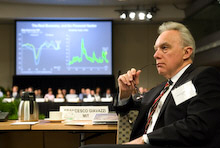
Typical street scene in Santa Ana, El Salvador. (Photo: iStock)
IMF Survey: Learning from Crisis Key to Restoring Economic Growth
May 3, 2012
- Crisis lessons offer insight for future policy
- Budget cuts work alongside growth-oriented policies
- Growth challenged in light of spending cuts
With many countries still experiencing an uncertain economic outlook, charting a course back to economic prosperity might prove to be difficult, but not impossible, delegates at a conference said.

Bocconi University professor of economics Francesco Giavazzi at the third annual IMF Fiscal Forum—where he spoke on balancing growth and fiscal tightening (photo: IMF)
2012 Spring Meetings
With economic uncertainty still lingering over many economies, policymakers, academics, and senior IMF officials gathered for the 3rd Annual Fiscal Forum to discuss global fiscal issues.
A day earlier, the IMF released its latest analysis of government debt and deficits across the world, saying fiscal risks are declining for many countries but remain very high in others.
In its report, the IMF identified three key policy implications:
• Fiscal policy should proceed at a steady pace—not too slow, not too fast
• Implementing a clear medium-term fiscal adjustment plan is a key requirement for sustainable growth
• Growth enhancing measures are important for the fiscal accounts
Particularly for the advanced economies, the IMF said fiscal adjustment through spending cuts or tax hikes is necessary to help ensure continued progress toward sound public finances. The adjustment can be painful if deficits are slashed by too much and too quickly because this risks stifling economic growth.
A way out
Economists, policymakers, and academics differ among themselves about the right mix of fiscal tightening and growth-oriented policies needed for European economies to navigate a way out of the debt crisis, and to help other economies around the world that are also dealing with high debt and deficits and low economic growth.
Some are calling for a rethinking of the way countries are addressing their debt and deficit problems, saying that cuts in public spending and tax hikes are putting too much of a damper on growth and doing nothing to help the millions of unemployed. They would like to see countries spend more now to help with growth, while taking steps that would commit them to structural changes and deficit cutting measures a year or two down the road.
Yet others warn that if governments do not take concrete steps to reduce their deficit and overall debt today by cutting spending and raising taxes, financial markets could demand higher rates of interest on money they lend to governments to finance their deficits. Borrowing at higher rates of interest could result in unsustainable situations for those countries that are already saddled with high debt because it makes it extremely difficult for them to repay their debt in the future.
Part of the problem is there is no single prescription for determining a budgetary fix.
An optimal fiscal policy
Looking back at the way governments responded to the 2008 financial crisis, and the extent to which those actions helped economies, could offer some insight into how much fiscal expansion to undertake and for how long.
In his keynote address, Israeli central bank governor Stanley Fischer said that in the decades leading up to 2008 the emphasis on fiscal policy as a stabilization tool declined relative to the emphasis on monetary policy, particularly for the advanced economies. However, he noted, “the pendulum has swung back following the experience of the last few years, not to the view that fiscal policy should be the dominant stabilization tool, but rather to the view that both monetary and fiscal policy should be used actively in stabilizing the economy.”
Fischer went on to address the question of the optimal fiscal policy. “The answer,” he said “must depend on how deep the recession is, on how large are the initial budget deficit and the initial debt stock, on the overall credibility of the government’s economic policies, on interest rates, on the flexibility of wages and prices, on the exchange rate regime, and on other economic variables.”
For European countries in distress, Fischer acknowledged that a viable growth strategy would need to consist of
• fiscal tightening, with the goal of restoring credibility with (and access to) financial markets; and
• structural reforms, focusing on making labor and product markets more competitive, financial sector reforms, and improving the overall business environment.
Restoring credibility
Fiscal Forum participants also heard from a diverse set of panelists at the day’s closing session. Moderator Gillian Tett posed the question to the panelists at the start of how can governments create a credible and workable fiscal policy.
IMF Deputy Managing Director David Lipton reaffirmed that there is no single rule that fits all countries and that, as one part of the solution, the IMF is helping countries improve budget institutions, including budget formulation and processes, forecasting, and developing medium-term frameworks. “In all of these areas, better institutions will mean better discipline, transparency, and communication with the people, as well as a better weighing of trade-offs inherent in making budget decisions.
Stanford University economics professor Miachael Boskin noted that successful fiscal consolidations tend to involve an 80-20 split between spending cuts and tax hikes and have to be credible both to the population and to the markets. “To be credible to the markets, the consolidation will have to over time, be something that the population can tolerate and can agree, however unpleasant some of the adjustments might be, is one that will stand the test of time.”

And credibility is a big part of what markets look at. With markets displaying volatility and seeming schizophrenic by expecting governments to take steps toward eliminating deficits, but yet reacting negatively to low growth estimates—something that in part is due to fiscal consolidation efforts—restoring credibility is front and center on policymakers’ agendas.
Michael Gavin, managing director and head of emerging markets strategy at Barclays Capital, explained that what is going on with markets reflects the behavior of rational investors. “Clearly markets are concerned that there will be inadequate fiscal consolidation and there will be a default that will hurt them. They are also concerned that, for reasons related to the fiscal consolidation or any other reason, times will become hard enough in the countries involved that the consolidation will prove to be too economically, socially, and politically painful to be tenable.”
American Federation of Labor-Congress of Industrial Organizations President Richard Trumka reminded that spending cuts often have a human cost. “From the large population’s point of view, credibility doesn’t exist when a policy makes those at the bottom of the economic heap pay for the excesses of those at the top. When you talk about spending cuts, if it is coming out of social security and medicare, it’s the wrong people paying the price, and [governments] don’t have the credibility.”
The importance of fairness in implementing fiscal adjustment drew agreement among the panelists, with several of them saying that a sharing of the adjustment burden needs to be perceived as fair and that the design of spending cuts must protect the most vulnerable.


